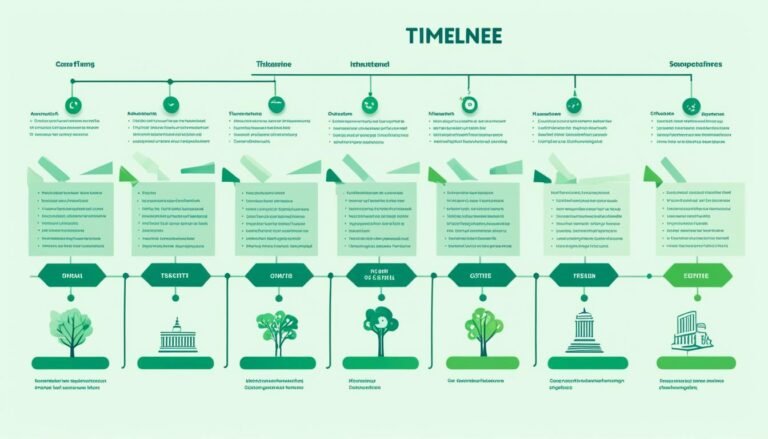The Importance of Compliance and Risk Management in Irish Financial Services
Did you know compliance roles in financial services are growing fast? They’re expected to increase by over 20% in the next decade. This shows how crucial compliance and risk management are getting, especially in Ireland. Financial institutions face big challenges with rules, keeping things stable, and protecting customers.
Having strong compliance and risk management is key. It helps avoid fines and builds trust with customers and partners. The Central Bank of Ireland sets strict rules to protect assets and customer interests. Companies like Matheson show how being proactive helps them deal with these challenges.
Dealing with complex rules and proving a company is trustworthy is tough. That’s why knowing about compliance and risk management is vital for financial services in Ireland. It helps them manage risks and stay ahead in the market.
Key Takeaways
- Compliance roles are among the fastest-growing career paths in financial services.
- Effective compliance and risk management are crucial for fostering trust and protecting consumer interests.
- Regulatory frameworks in Ireland demand strict adherence to ensure operational resilience.
- Engaging with regulatory bodies early can mitigate risks and minimize penalties.
- Investing in compliance training can improve career opportunities and professional growth.
- Operational stability is increasingly linked to effective compliance strategies within organizations.
Introduction to Compliance and Risk Management in Financial Services
Compliance and risk management are key in the financial services world. They help financial institutions follow the law and handle threats to their work. Doing this well protects their operations, reputation, and the trust people have in them.
Financial services companies face many risks, like employee mistakes and not following the law. These risks can cause big financial losses, including big fines and damage to their reputation. It’s important to analyze these risks to understand them and find ways to lessen them. This helps build a strong compliance program.
Compliance risks cover many areas, like protecting data, IT security, fighting corruption, fraud, and following environmental laws. Companies need to look at both the numbers and the situation to understand these risks well. They use numbers to figure out how much money could be lost and how likely it is to happen. They also use a system that uses colors to help decide which risks are most important, even when there’s not much data.
Since compliance risks always change, it’s important to keep checking and updating how you handle them. Companies need to change their plans as laws and threats change. They should decide how to deal with each risk, like reducing it, accepting it, passing it on, or avoiding it. Things like training and talking to employees can help lower risks.
In short, having a strong plan for compliance and risk management gives financial services companies an edge. It makes them stronger and more honest, keeping them in line with the law. Companies that do well in this area not only avoid problems but also do better in the competitive market.
The Regulatory Landscape for Irish Financial Services
The rules for Irish financial services are key to keeping the market stable and safe for consumers. Many groups watch over these rules, like the Central Bank of Ireland. They make sure everyone follows the rules, keeping consumers safe and the financial system honest.
Overview of Regulatory Bodies and Their Roles
Important regulatory bodies look after the Irish financial sector include:
- Central Bank of Ireland: It’s the top group that checks on financial places to make sure they follow the rules.
- European Central Bank: It helps keep the eurozone stable and looks after big financial institutions.
- European Securities and Markets Authority (ESMA): It makes sure financial markets are safe for investors and honest.
- European Insurance and Occupational Pensions Authority (EIOPA): It looks after insurance and pension areas, making sure they follow EU rules.
These groups work together to keep the financial system safe and build trust. They keep up with new rules to make sure everything stays secure.
Key Regulations Impacting Financial Institutions
Financial places in Ireland have to follow many big rules, like:
- Solvency II: It checks if insurers can pay out money when needed, including risks from the environment.
- Anti-Money Laundering (AML): A key rule that makes sure places do their homework to stop money crimes.
- Sustainable Finance Disclosures Regulation (SFDR): It makes investments more open about how they help the planet.
- Taxonomy Regulation: It sets a way to label activities that are good for the environment.
The Central Bank of Ireland has strict rules to follow these laws. Meeting these rules is getting harder, so there’s a big need for experts in following rules. As rules change, companies must stay alert and adjust to keep up with the best standards.
Understanding the Concept of Compliance
Knowing about compliance in financial services is key for both businesses and consumers. It means following the rules and guidelines set by laws. This helps protect consumers and keeps the financial industry honest.
Definition and Importance of Compliance in Financial Services
Compliance means making sure financial institutions follow the law. It’s important for many reasons:
- Legal Obligations: Following the rules protects companies from legal trouble and damage to their reputation. This is more crucial as rules get stricter.
- Consumer Trust: Being highly compliant builds trust with consumers. Ireland faces trust issues in financial services, as shown in the 2018 Edelman Trust Barometer.
- Operational Effectiveness: A strong compliance system helps keep things running smoothly. It ensures rules are followed, cutting down on mistakes that could be costly.
Compliance as a Strategic Advantage
Compliance is more than just following rules. It gives financial institutions a competitive edge. Those that focus on compliance stand out in the market. This leads to:
- Brand Loyalty: Companies that put consumers first see more loyalty and keep customers coming back. This helps them stand out in a crowded field.
- Market Differentiation: Banks and other financial firms that stick to strict compliance can use this as a selling point. It attracts customers who want honest and transparent services.
- Informed Decision-Making: Good compliance builds a culture of accountability. This lets companies make smart choices that meet both legal and customer needs.
The Importance of Compliance and Risk Management in Irish Financial Services
In Ireland, the link between compliance and risk management is key for financial firms. It protects consumers and makes operations more stable. It also focuses on ethical business and keeping the organization honest.
The Role of Compliance in Safeguarding Consumers
Consumer safeguards rely heavily on compliance. The Central Bank of Ireland is now more focused on how firms act and their culture. This is after big issues in the financial world. The Consumer Protection Code (CPC) has been made stronger to protect people, especially those with mortgage arrears and small businesses.
Ignoring how to manage risks can lead to big problems for firms. They could face legal action and damage to their reputation. As people want firms to be accountable, it’s crucial for companies to focus on being compliant. This keeps trust in their services strong.
Impact on Operational Resilience and Organizational Integrity
How well financial firms in Ireland do depends on good risk management that follows the rules. They need to spot, check, and handle risks early to lessen their effects. The Central Bank of Ireland has brought in a new framework to make customers better off and hold firms responsible.
By putting compliance and risk management at the heart of their plans, firms can better handle challenges. This way, they stay true to their values and can do well through changes in rules and the market.
Frameworks for Effective Risk Management
Financial institutions need strong risk management frameworks to handle operational risks and meet their goals. A good plan helps them deal with uncertainty, keep everyone accountable, and follow the law.
Developing a Comprehensive Risk Assessment Framework
Creating a detailed risk assessment framework means setting up a Risk and Control Self-Assessment (RCSA) process. It should be consistent and cover all parts of the organization. It’s important to have clear roles and to quickly fix any control issues.
This approach helps in planning and making smart decisions. It’s key to managing risks well.
- Define clear roles and responsibilities for risk ownership.
- Conduct regular risk identification sessions to stay ahead of potential issues.
- Establish a strong control environment to support internal controls.
Monitoring and Reporting Mechanisms
Good monitoring systems are crucial for managing risks. They help take action quickly and keep everyone accountable within set risk limits. Back testing is important too, as it compares actual losses to planned controls, leading to better risk management.
Linking these systems with other ORM parts is key for a successful risk management program.
Risk committees play a big role in following the RCSA and sharing info about risks. As the financial world changes, it’s important for companies to be flexible. They should update their risk management plans to keep up with new rules and best practices.
Anti-Money Laundering (AML) and Its Relevance
Anti-Money Laundering (AML) rules are key to keeping financial systems safe. In Ireland, the Criminal Justice (Money Laundering and Terrorist Financing) Act 2010 sets clear rules. These rules help stop money laundering and support fighting terrorism.
The Central Bank of Ireland makes sure financial groups follow AML and Counter Financing of Terrorism (CFT) rules. They make sure groups do their due diligence on customers. This means they check who owns companies and look out for people with a lot of power.
The law requires banks to report, have strong policies, train staff, and keep records. These steps help prevent financial crimes and build trust in the market. The Central Bank also gives guidelines to help banks deal with AML risks.
Money laundering risks are getting bigger as money moves more around the world. Banks and other financial groups face big risks, especially with new types of services. It’s important to educate everyone about AML to keep it under control.
Fraud Prevention Strategies in Financial Services
Keeping financial services safe from fraud is key. Different fraud types can harm institutions, hurting their reputation and security. It’s important to understand these threats to prevent them.
Common Types of Fraud in Financial Institutions
Financial institutions face many fraud types that risk their trust and operations. Some common ones are:
- Identity Theft: This is when someone pretends to be another person to get financial gains.
- Credit Card Fraud: Using someone else’s credit card info without permission causes big financial losses.
- Account Takeover: Criminals get into someone’s financial accounts, making unauthorized buys or transfers.
- Wire Fraud: Scammers trick people into sending money to fake accounts.
Best Practices for Fraud Prevention
Strong fraud prevention is key to keeping finances safe and protecting customers. Good practices are:
- Continuous Monitoring: Always check for odd activities to spot fraud early.
- Staff Training: Teach staff to spot and report fraud, creating a watchful team.
- Adopting Advanced Technology: Use data analytics and AI to catch fraud in real-time.
- Collaborative Approaches: Team up with groups like LexisNexis Risk Solutions for better risk management.
Data Protection and Cybersecurity in Financial Services
In the financial world, keeping data safe is key. Companies must follow strict rules to protect personal and financial info. These rules help keep consumer trust and make companies more credible.
Overview of Data Protection Regulations in Ireland
Ireland has tough rules for keeping consumer info safe. The GDPR sets clear rules for financial firms. Breaking these rules can lead to big fines, up to €20 million or 4% of what the company makes.
A PwC survey showed 92% of U.S. companies focus on following GDPR. This shows how important it is worldwide.
Implementing Effective Cybersecurity Measures
Good cybersecurity is key to preventing data breaches in finance. Companies need to have strong plans that meet industry standards. They should focus on training, checking risks, and planning for emergencies.
Data breaches in finance cost about $4.35 million on average in 2022. This shows how important strong cybersecurity is. Legal firms like Matheson help companies follow the rules, manage data rights, and fight cyber threats.
The Role of Corporate Governance in Compliance
Effective corporate governance is key to ensuring financial institutions follow the rules. It helps manage risks and makes sure the board is responsible for following laws. Without good governance, companies might not meet the standards expected by regulators and investors in finance.
Establishing Governance Structures for Risk Management
The Corporate Governance Code for Fund Service Providers sets basic governance standards. It applies to Administrators, Custodians, and Depositaries regulated by the Central Bank of Ireland. These groups must have strong governance and risk management plans. The Board of Directors is at the heart of this, responsible for following the Code.
Importance of Board Oversight and Accountability
Board accountability is vital for good governance. Boards must keep an eye on compliance and check if rules are being followed. The Central Bank of Ireland says boards should lead in making sure compliance programs work well. Boards should share updates on compliance in their annual reports. This builds trust with investors and makes financial institutions more trustworthy.
Consumer Protection in Financial Services
Consumer protection is key to trust and stability in financial services. Financial institutions must treat consumers fairly to build strong relationships and keep trust. The Central Bank of Ireland’s updated Consumer Protection Code aims to improve this important principle.
Ensuring Fair Treatment of Consumers
The new code puts consumer protection first. It stresses clear and fair rules. Institutions must make sure customers understand their choices. This makes everyone more accountable and puts customers first.
The Role of Regulations in Protecting Consumer Rights
Strong rules are crucial for protecting consumers. They keep rights safe and build trust in the financial world. The updated Consumer Protection Code brings together old rules and makes firms more accountable. This helps tackle new challenges like fast tech changes and customer risks. It ensures fair treatment and helps the market stay competitive.
Conclusion
Compliance and risk management are key in Ireland’s financial sector. Over 10,000 entities are regulated by the Central Bank of Ireland. These entities manage assets worth more than €3 trillion. A strong compliance framework is crucial to protect consumers and financial institutions.
Adapting to regulatory changes is essential in today’s complex financial world. It helps keep the market stable and trustworthy. By following strict compliance rules, consumers stay safe, and financial institutions can handle new rules better.
There’s a big push for better risk management strategies too. Ireland’s financial services use AI and data analytics to innovate while following the rules. This balance is important for now and the future of the sector.
As financial institutions in Ireland grow, compliance and risk management will be key. They help meet rules and build trust with the public. This focus on compliance makes the financial system safer for everyone involved.
Source Links
- Regulatory Risk Management and Compliance | Legal Services | Matheson
- What’s it like to work in compliance in financial
- Chapter 6 Risk Management | Central Bank of Ireland
- Compliance Risk Management in 3 Essential Steps
- Professional Diploma Compliance (LCI), accredited by
- Key Trends Shaping Irish Financial Services in 2024
- Financial Regulation and Supervision | Central Bank of Ireland
- Hiring Compliance Candidates in Ireland’s Financial Services Industry – the challenges.
- NCI Courses – H7CFS – Introduction to risk management and compliance in Financial Services
- Culture and Consumer Protection – The Role of Compliance
- Conduct Risk & Culture
- Risk Management | Central Bank of Ireland
- Compliance vs. Risk Management: Meaning, Difference & Tools | GEP Blog
- RCSA Best Practices: Considerations for Effective Risk Management & Compliance in 2024 | Forvis Mazars
- Managing Risks: A New Framework
- Regulation for Anti-Money Laundering in Ireland
- Risk and Guidance | Central Bank of Ireland
- Why fraud awareness should be a top business priority
- Financial Crime Compliance & Risk Management | LexisNexis Risk Solutions
- Top 9 Cybersecurity Regulations for Financial Services | UpGuard
- Data Protection, Privacy and Cyber Security | Matheson
- Banking and Financial Data Security Compliance: Requirements & Best Practices | Ekran System
- Corporate compliance
- Compliance Institute Media Coverage Corporate Governance Survey
- A Revised Consumer Protection Code: a foundation for further success
- Consumer Protection Code Consultation Paper
- The Role of Financial Conduct Regulation and 2020 Priorities
- AI and Risk Management in Ireland | Deloitte Ireland
- Financial Services Regulation & Compliance – Banking September 2018 | Oct – 2018








